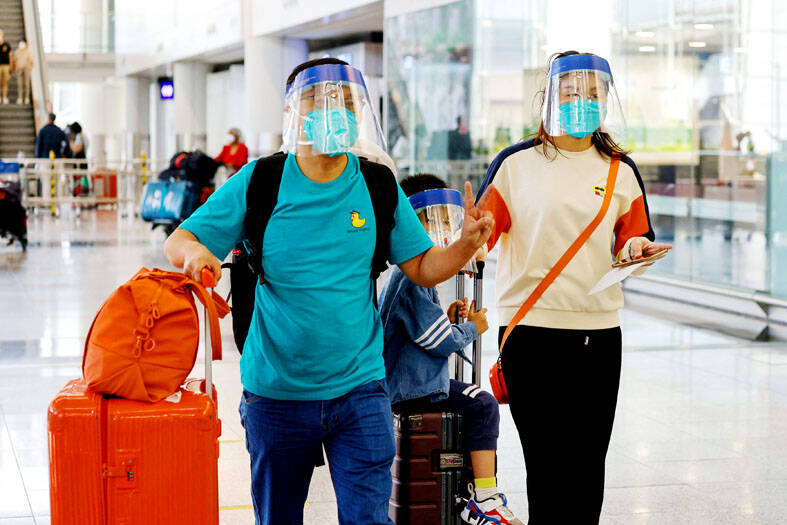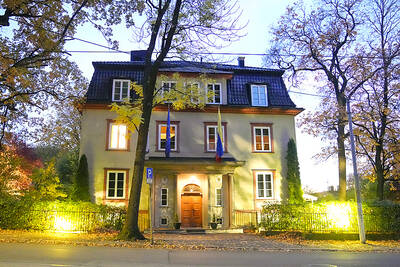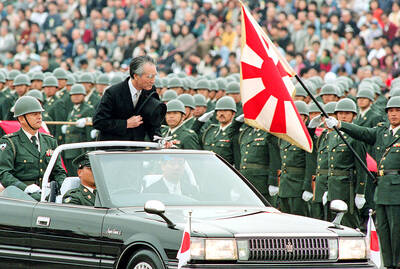Hong Kong is preparing for a surge in travel after it yesterday ended mandatory COVID-19 hotel quarantine for international arrivals, with travel companies reporting a significant increase in requests.
The curbs were lifted for the first time in more than two-and-a-half years, after Hong Kong Chief Executive John Lee (李家超) last week said that such arrivals could return home or seek accommodation of their choice, but had to self-monitor for three days on entry.
“I have been waiting for this for almost three years,” said 58-year-old Hong Kong resident, Barbara Van Moppes, who arrived from Bangkok. “The rest of the world has opened up and so Hong Kong needs to open up now and return to normal, because it’s such a fantastic place to live.”

Photo: Reuters
All international arrivals in the territory had previously been forced to stay for as long as three weeks in hotel quarantine at their own expense, although the period was gradually cut to three days.
Yesterday’s change still leaves Hong Kong far behind much of the world in dropping curbs. International arrivals are barred from bars and restaurants for three days.
Although allowed to go to work and school, they still need to do multiple COVID-19 tests in the first week after arriving.
Still, Hong Kong’s Travel Industry Council expects outbound travel to surge as much as 50 percent for the next few months, executive director Fanny Yeung (楊淑芬) told Radio Television Hong Kong.
Growth would be capped by the number of outbound flights, but Yeung said that inbound tourism, inhibited by the existing curbs, was unlikely to grow by much.
Travel Web site Expedia Hong Kong said searches for Japan surged 10-fold last week while those for Taiwan almost doubled over the prior 14 days.
Trip.com said flight searches surged 95 times and orders soared 50 percent on its Hong Kong site on the week, with Tokyo, Bangkok, Osaka and Singapore featuring as top destinations.
The International Air Transportation Association said the next step would be for Hong Kong to scrap all COVID-19 measures.
The territory had been a global outlier outside mainland China in imposing hotel quarantine for international arrivals, in line with the country’s “dynamic zero” COVID-19 strategy.
Business groups, diplomats and many residents had slammed the COVID-19 rules saying they threatened Hong Kong’s competitiveness and standing as a global financial center.
Still, residents landing at the territory’s airport were thrilled by yesterday’s easing.
“It’s now totally hassle-free, so I just came out within 30 minutes,” said businessman Marjuk Mutahlif, 32. “I can go.”

The Venezuelan government on Monday said that it would close its embassies in Norway and Australia, and open new ones in Burkina Faso and Zimbabwe in a restructuring of its foreign service, after weeks of growing tensions with the US. The closures are part of the “strategic reassignation of resources,” Venezueland President Nicolas Maduro’s government said in a statement, adding that consular services to Venezuelans in Norway and Australia would be provided by diplomatic missions, with details to be shared in the coming days. The Norwegian Ministry of Foreign Affairs said that it had received notice of the embassy closure, but no

A missing fingertip offers a clue to Mako Nishimura’s criminal past as one of Japan’s few female yakuza, but after clawing her way out of the underworld, she now spends her days helping other retired gangsters reintegrate into society. The multibillion-dollar yakuza organized crime network has long ruled over Japan’s drug rings, illicit gambling dens and sex trade. In the past few years, the empire has started to crumble as members have dwindled and laws targeting mafia are tightened. An intensifying police crackdown has shrunk yakuza forces nationwide, with their numbers dipping below 20,000 last year for the first time since records

EXTRADITION FEARS: The legislative changes come five years after a treaty was suspended in response to the territory’s crackdown on democracy advocates Exiled Hong Kong dissidents said they fear UK government plans to restart some extraditions with the territory could put them in greater danger, adding that Hong Kong authorities would use any pretext to pursue them. An amendment to UK extradition laws was passed on Tuesday. It came more than five years after the UK and several other countries suspended extradition treaties with Hong Kong in response to a government crackdown on the democracy movement and its imposition of a National Security Law. The British Home Office said that the suspension of the treaty made all extraditions with Hong Kong impossible “even if

Former Japanese prime minister Tomiichi Murayama, best known for making a statement apologizing over World War II, died yesterday aged 101, officials said. Murayama in 1995 expressed “deep remorse” over the country’s atrocities in Asia. The statement became a benchmark for Tokyo’s subsequent apologies over World War II. “Tomiichi Murayama, the father of Japanese politics, passed away today at 11:28am at a hospital in Oita City at the age of 101,” Social Democratic Party Chairwoman Mizuho Fukushima said. Party Secretary-General Hiroyuki Takano said he had been informed that the former prime minister died of old age. In the landmark statement in August 1995, Murayama said